Fides Lim never met a prickly prison guard she couldn’t stand up to. At the gates of the Correctional Institute for Women (CIW), Lim, of the political prisoner support group Kapatid, argued with all of the prison guards. They eventually begin to concede to her just demands.
The diminutive senior citizen and some volunteers had brought snacks and toiletries for the 11 convicted women political prisoners inside. “Not allowed” the guards repeated, inspecting each item.
Lim flailed her arms every time they denied her, her closed fists landing on her hips. She asked for the names of all the guards; she repeated to them the rights of prisoners to proper nutrition and visitation. Eventually they gave in, after Lim berated them for denying the incarcerated women basic human needs. With some concessions on personal items, Lim successfully asserted her right to carry food into the jail.
“Every inch is a battle. You cannot get anywhere if you do not assert,” she said. Lim has gone through this tit-for-tat multiple times in many other prisons.
She’s seen raw tomatoes sliced up, pizzas turned into what looked like pig’s feed, and noodle dishes barred in what the guards say are standard procedures to intercept contraband. Lim said it’s dehumanizing, just another way to keep the spirits of prisoners down.
Even with all the trouble, she said more often than not, it’s more difficult getting things and people out of the prison rather than in.
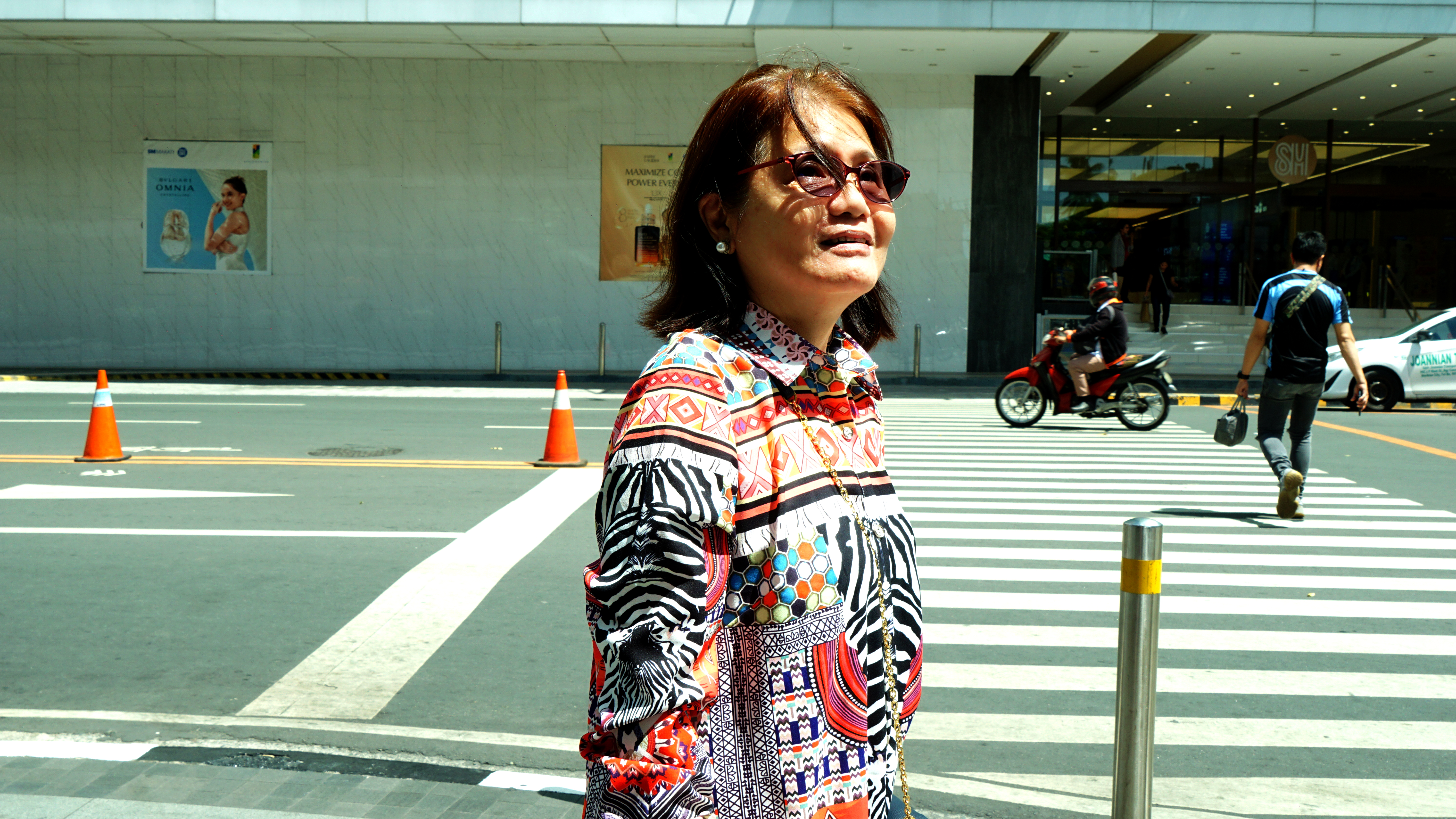
Fides Lim helped revive Kapatid, an organization originally established during the Martial Law period, in response to the arrest of her husband, activist and peace consultant Vic Ladlad in November 2018 on illegal possession of firearms and explosives charges. She has also been detained twice, as a student activist in the 1970s and with her husband in 1990. Photo by Cindy Aquino.
Jail Sickness
Inside the CIW, a women’s prison located in Mandaluyong, Metro Manila, Philippines, there are 11 women considered to be political prisoners. All 11 are from peasant backgrounds or are land rights activists, and all have been convicted of illegal possession of firearms and explosives, with many of them serving close to 40-year sentences. The charges stem from a particular tactic used by the military to plant evidence like bullets and bombs as supposed proof that the incarcerated were involved in insurgent activity.
Marites Coseñas, 49, used to be active with her local peasant association in Northern Samar province, looking to boost crop production and gain better prices for their harvests.
In 2009, she accompanied one of the association’s more senior leaders to get looked at by a doctor in Manila. On the way back, she was detained along with the man she came with, who was tagged by the military as a longstanding rebel leader in the New People’s Army (NPA).
“We were kept blindfolded for nine days inside the military camp. They pressed us for evidence and information, but we had none to give. When our blindfolds were taken off, somehow we’d apparently surrendered to them as NPA rebels,” Coseñas explained.
Coseñas has struggled with her health since being imprisoned. She developed a large cyst on her breast in May 2022 and pleaded with the warden repeatedly to see a doctor. The jail finally relented in December 2023, allowing an ultrasound and then again in June 2023 after pressure from activists and other inmates.
The jail made sure that it spent nothing on her medical expenses.
Activists raised the funds for transportation and Coseñas’ hospital expenses. Coseñas previously worked washing dishes and clothes in the jail, earning less than $10 a week. She needed the money to buy items in the jail, which cost three times more than in regular stores. The ache of carrying the cyst has prevented her from most activity sine May 2022.
“I have to be careful when I sleep now or when I do any other activity, the pain is so intense,” said Coseñas, who is waiting for the results of her first biopsy conducted in February 2024.
And yet, she feels lucky, as most women “only leave [the prison] when they’re dead.”
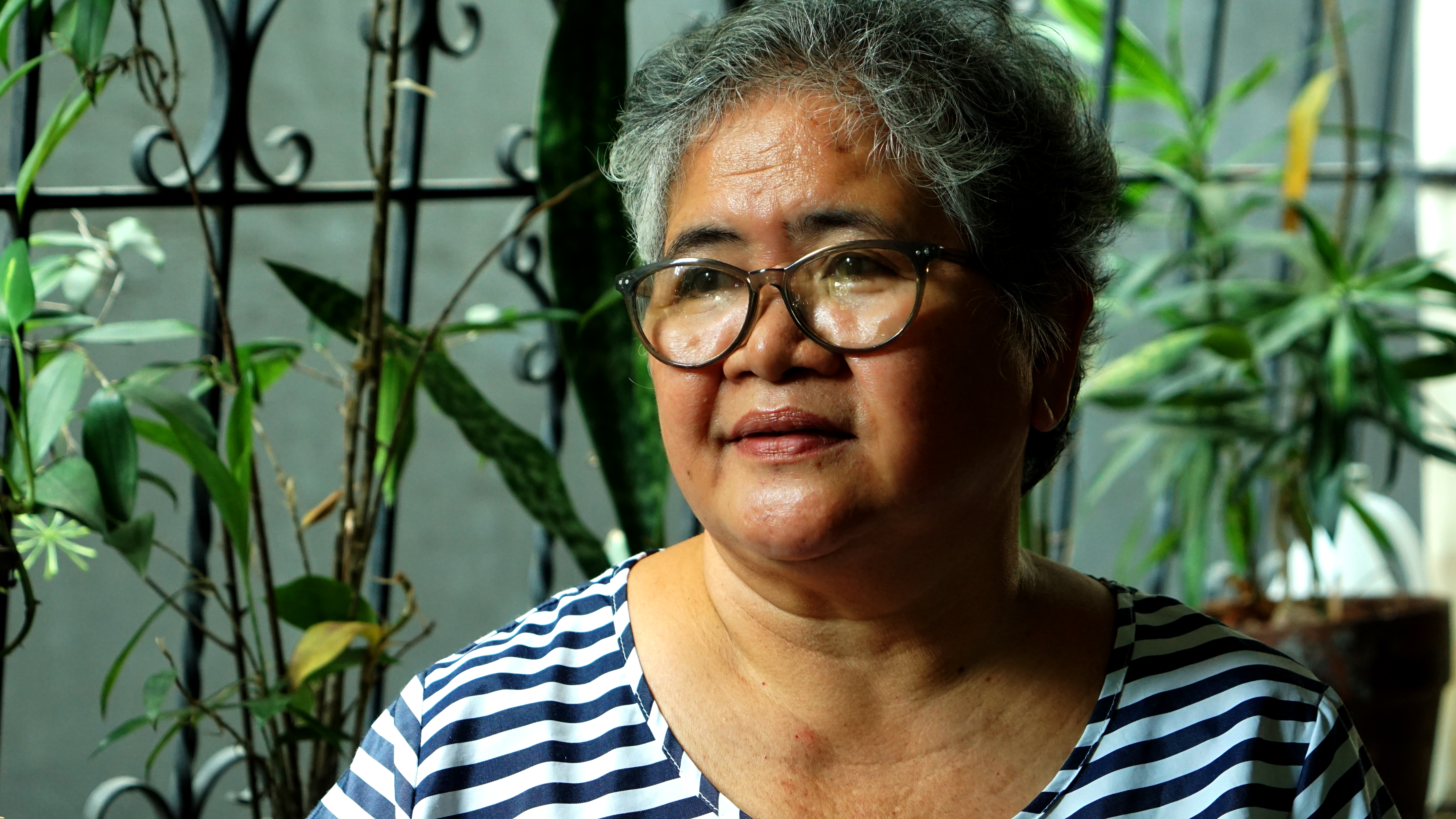
Ofel Balleta is the services officer for human rights group Karapatan. She has visited political prisoners all over the country. Photo by Cindy Aquino.
Ofel Balleta, the services officer for human rights group Karapatan, has visited political prisoners all over the country. Sanitation, nutrition, and medical issues are usually among the top concerns. “Some jails won’t even allow me to bring in sanitary napkins!” she lamented.
“You’d be surprised at how sick an otherwise healthy person can get when they land in jail. And if they get out, their illness just goes away,” shared Balleta, pondering the science and psychology behind the health conditions prisoners develop.
At 4:00 a.m. on October 31, 2019, activist couple Cora Agovida and Mikhail Bartolome woke inside their small studio apartment in Manila to the sounds of a rattling doorknob. Moments later, heavily armed police swarmed inside and swiftly accosted the pair.
Their two children were taken into custody and dropped off at the nearest social welfare station, with police telling the caretakers to just keep them there. It would be nearly 24 hours before Agovida’s relatives discovered the children’s whereabouts, as the police mixed the two with other street children.
Agovida, of the women’s group Gabriela, was charged with illegal possession of firearms and explosives after police reported finding grenades hidden in her children’s clothing drawer.
The couple were taken to Manila City Jail, infamous as one of the world’s most overcrowded prisons. Some detainees wait years there for their day in court amid the slowly grinding Philippine justice system.
In their classroom-sized cell, around 130 women slept, stacked on bunk beds with one electric fan for all of them to share. Some slept under the mats because they couldn’t afford the rental fees imposed by the guards for bedding.
“Everyone had to sleep on their side, always with another person close to your head, toes, and to your left and right,” Agovida revealed to The Diplomat.
Months later, the pandemic happened. Social distancing was impossible and it would be late 2021 before any of the detainees received any medical attention or testing. Worse, visitation was not permitted. Many women deteriorated, physically and psychologically, becoming bags of bones weeping in corners for days on end.
But Agovida said the most ever-present source of contempt was the lack of clean water. They prayed for rain, begging guards to catch any of it with their buckets. Each detainee was given just 4 liters of water a day for showering, drinking, and washing.
“So when I showered, I stepped inside my bucket. Whatever water was left over, I used for laundry and bathroom breaks. When I was done, I gave that to the next person who was low on water, then she’d do the same. And everyone would just be passing around used water because there was so little to go around,” Agovida shared, grinding her teeth at the painful memory.
As a result, dirt, mixed into the water along with the blood of inmates on their monthly period, coated each prisoner – compromising the health of the entire jail.
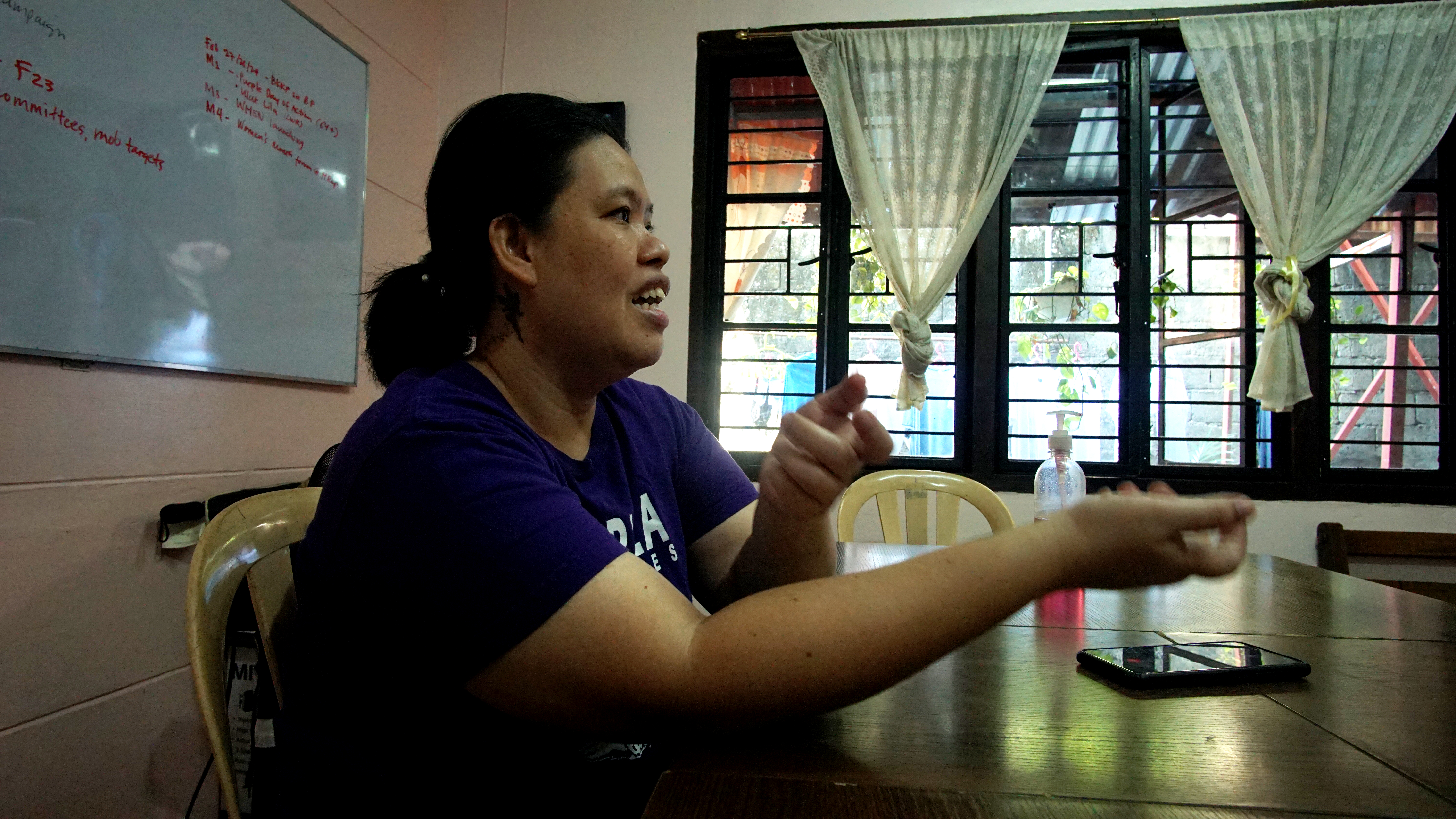
Cora Agovida, pictured here, was arrested alongside her partner in a pre-dawn raid in 2019. Photo by Cindy Aquino.
Crude Standards
The Philippine government allots $0.27 a day for each prisoner’s medical needs and $1.25 a day for food. But most prisoners insist it feels like they persist on virtually nothing.
According to the Center for Women’s Resources (CWR), the Philippines grossly lags behind in upholding the Bangkok Rules, a guide to how women’s prisons should function. The Bangkok Rules state in broad terms how jails should provide healthcare access, grant humane treatment, utilize non-invasive search procedures, and support children accompanying their mothers.
The CWR’s Cham Perez blames the “snail-paced justice system, which allows women to languish in these conditions.” Grace Versoza is the longest-serving political prisoner without a sentence, having been detained in Samar Provincial Jail since 2013.
Globally, women represent only between 2 percent and 10 percent of prison populations. Historically, jail designs have focused on containing a male population, so there is very little sensitivity in the structures or mechanisms in the criminal justice system for the needs of women, said the CWR.
For activists especially, “and even those who are jailed for petty crimes, the state wants to project an image of power. Meanwhile, the congestion and poor sanitation can be seen as politically motivated, to keep spirits low,” Perez explained.
According to the CWR’s tally, out of 812 political prisoners nationwide, 163 are women. Under President Ferdinand Marcos Jr., 23 female activists have been jailed, meaning at least one women has been detained each month since he became president. Marcos has kept many of his predecessor’s policies intact, enabling a crackdown on dissent. He also arguably takes cues from his father, a former dictator in the country during the 1970s and 1980s.
Perez argued that Marcos’ efforts to make the Philippines appear friendly and welcoming mask a dangerous reality.
“Duterte was an outright misogynist in his verbal and policy attacks. But from Marcos, you won’t hear anything bad. He even demands respect for human rights. But that’s more dangerous! Because in practice, he’s doing everything to suppress anyone questioning his anti-women and anti-people policies,” she said.
While the inhumane conditions could be intended to lower morale and obstruct solidarity, in Agovida’s experience, it usually has the opposite effect. The women of Manila City Jail stick together.
When Bureau of Jail Management and Penology (BJMP) officials held seminars with prisoners about steering clear of “state enemies,” a reference to activists, Agovida heard about it immediately from other prisoners.
“BJMP officials are abusive, they degrade [prisoners] every day. So we all have our own reasons to be angry with them, especially after what happened to Reina Mae [Nasino],” said Agovida.
Reina Mae Nasino was an activist jailed around the same time as Agovida in November 2019. After giving birth in jail in July 2020, the guards separated her from her newborn, a child she named River. Neglected by the prison staff, River passed away in October 2020. The jail’s cells cackled with indignation. Public outrage followed; significant changes to overall jail policy did not.
Incarcerated pregnant women, like any other prisoner, are obligated to keep their handcuffs on at various times of the day. This makes it difficult for them to give birth and breastfeed their newborns, as each time a hand gets close to their child they risk the metal scratching the baby’s skin.
Amanda Echanis, who was arrested in December 2020 with her 3-month-old son was allowed to keep her baby in prison on humanitarian grounds but only after her lawyers heavily championed her cause. The same cannot be said for many others.
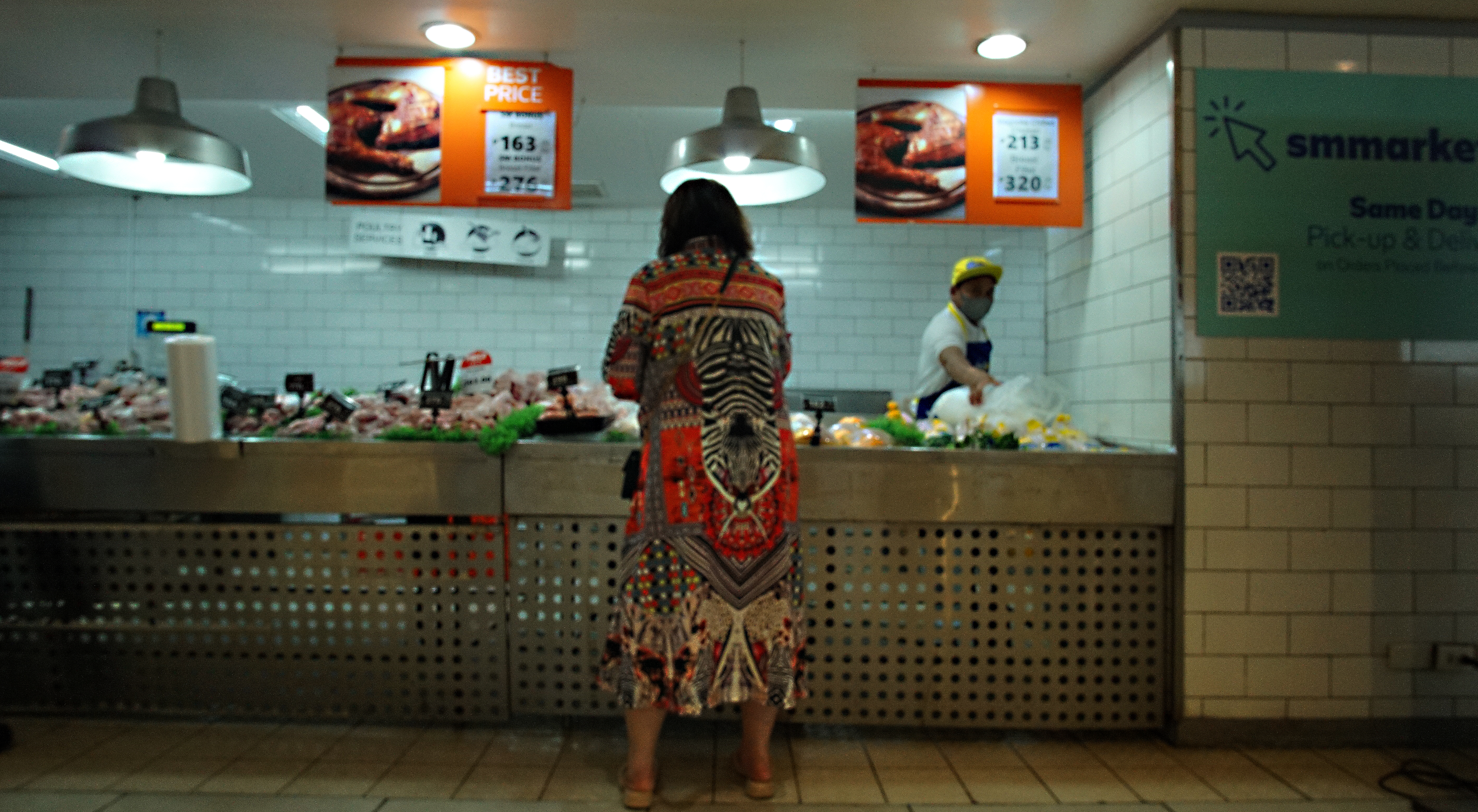
Fides Lim shops for groceries to bring to prisoners. Photo by Cindy Aquino.
Lingering Scars
Alex Pacalda was arrested in 2019. She initially gave a statement surrendering to the military as an NPA rebel but later recanted, stating that she was coerced. Shortly after, the courts handed down her reclusión perpetua sentence. From the Latin for “permanent imprisonment,” reclusión perpetua entails a maximum sentence of 40 years without the possibility of parole or early release, barring a pardon after a minimum of 30 years.
Pacalda had spent many years isolated behind bars in Quezon Province, with her captors wanting to keep the fiery public speaker away from other prisoners. She languished in solitary confinement for too long to count.
It was almost enough to make her lose hope of ever living any kind of life. She grew gaunt and sickly. “I often thought about my parents, and how hard this must be for them,” Pacalda, now 28, said.
She shrugged off any suggestion of mourning her youth as most of her 20s will be spent in prison. For Pacalda, the decision to carry on as an activist has always outweighed any of her doubts.
Pacalda’s transfer to the CIW in March 2023 did help to resuscitate her waning optimism. With 10 others to join, the female political prisoners wrote songs and poetry about injustices, and discussed social issues with each other. They launched campaigns for better food prices and jail conditions. Pacalda was again herself, in the thick of a struggle.
“In here, you have to learn to survive in the graveyard of the living,” she said, with a wry smile.
But even freedom has its lasting scars. Agovida swore never to wear yellow, the color of the jail uniform, after her case was dismissed in November 2021 along with her husband’s. While still in contact with some of her prison mates, she has never been back to visit, unable to handle reliving the trauma.
Agovida faced a personal crisis upon release, debating with herself whether she would return to activism and its possible perils after her ordeal. She was unable to sleep with thoughts of the wobbling doorknob in the dead of night. It didn’t help that she was receiving death threats online from an active member of the Philippine army.
Even her two children are growing up with an acute sense of insecurity, scoping out the vicinity for police when going to school and reporting back to their parents. Agovida felt as though familial normalcy might be too far out of reach. And yet she resolved to help every other woman incarcerated, rejoining Gabriela and heading its “Free Our Sisters” campaign.
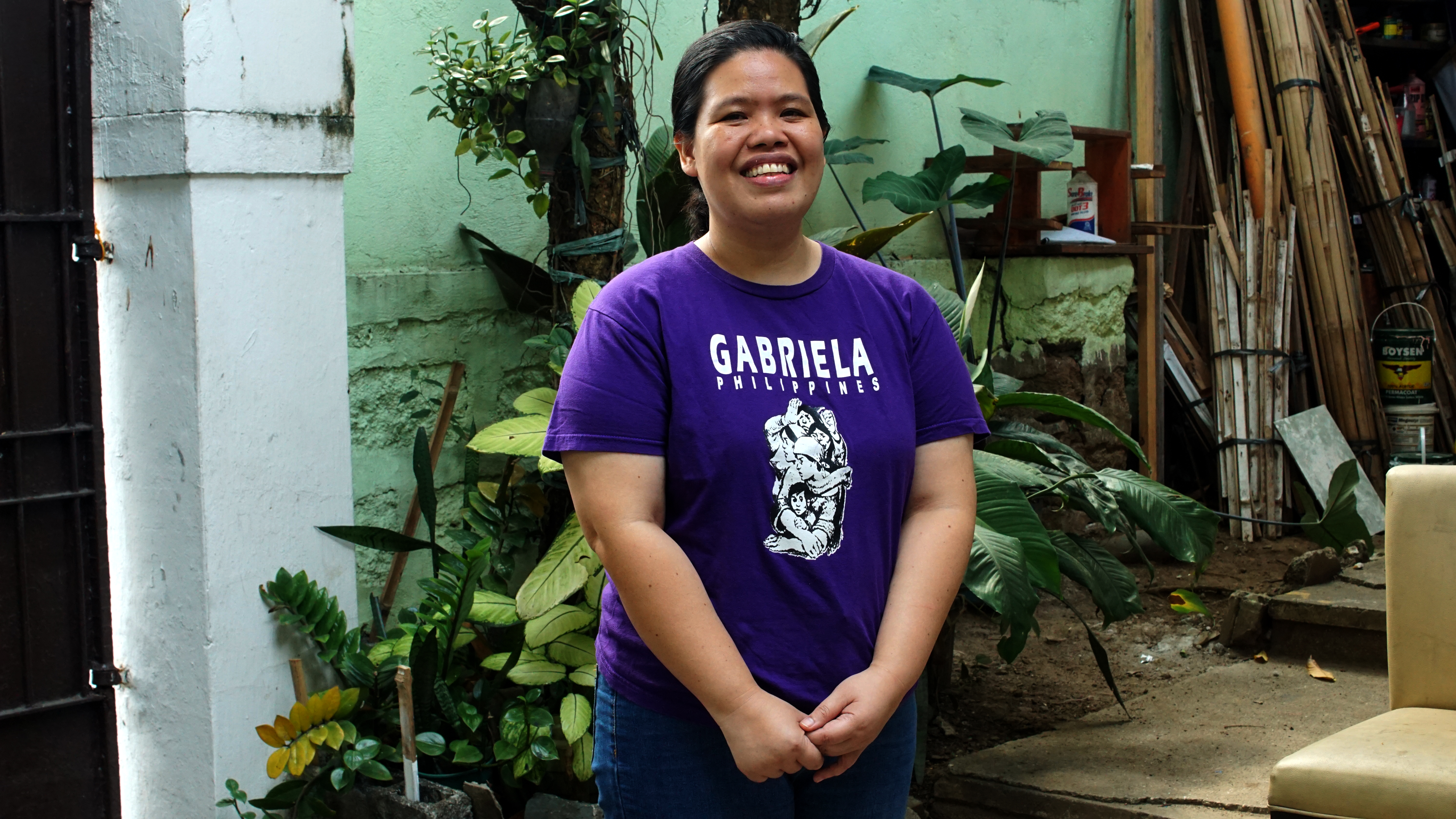
After her release, Agovida rejoined the the women’s group Gabriela, heading its “Free Our Sisters” campaign. Photo by Cindy Aquino.
Whenever Agovida visits another jail, pangs of kinship wash over her. “Been there,” she said, “but this time, I’m here for them.”
For Fides Lim, there’s a lot less catharsis to her work with political prisoners. She helped revive Kapatid, an organization originally established during the Martial Law period, in response to the arrest of her husband, activist and peace consultant Vic Ladlad in November 2018 on illegal possession of firearms and explosives charges.
“When Vic was arrested this time, I was furious. And part of the work that I do is out of my continuing anger. It is a controlled fury, to get back at those who arrested my husband,” said Lim.
Ladlad had been arrested two other times, including once during Martial Law. Lim has also been detained twice, as a student activist in the 1970s and with her husband in 1990.
If needed, Lim unleashes just enough of her rage to benefit those behind bars. Hence on every visit, whenever she is challenged by obstruction, she switches on a different emotion, one that channels her inexorable drive.
“In their eyes, I’m the devil,” Lim quipped. “Somebody has to do the work. I’m doing this because I’m fighting back.”
This story was supported by Oxfam Philippines.

































